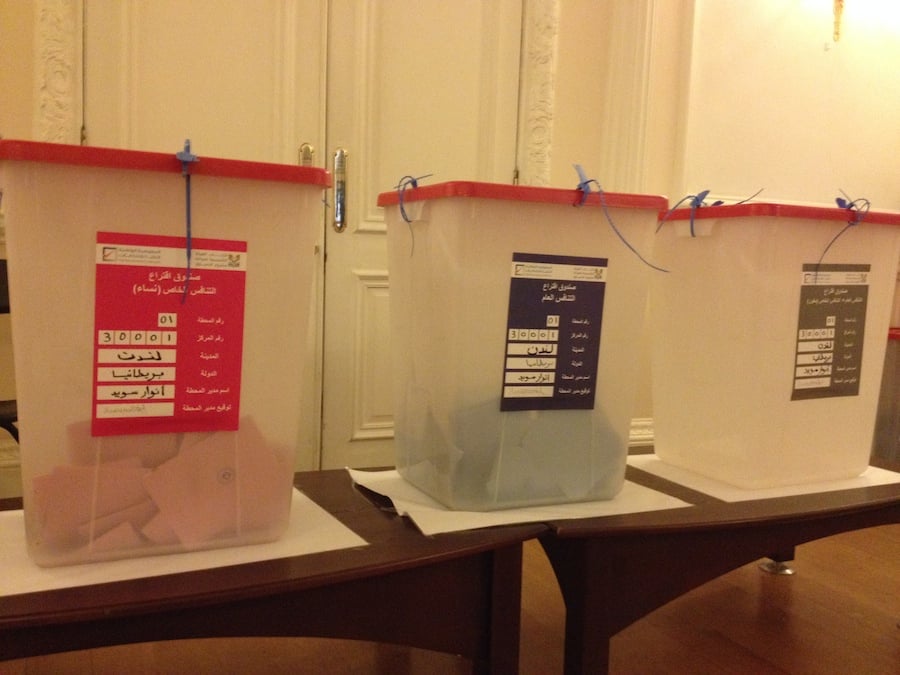
Voters dipped their fingers in ink that stains the skin for several days to ensure no-one voted twice (Photo: Tom Westcott)
Over the past three days, Libyans living abroad have been casting their votes in the elections for the Constitutional Drafting Committee. In London, two rooms of the Libyan embassy were transformed into a voting centre, with lists of candidates and numbers in one room and the voting booths and boxes in another.
A bilingual team from the International Organisation for Migration (IOM), tasked with running the elections by HNEC, were on hand to welcome Libyan voters and explain the procedures.
“The IOM was recruited by HNEC for the second time, after successful elections for the General National Congress (GNC) in July 2012,” Libyan national advisor to the IOM, Salem El-Maiar, told the Libya Herald. Although UN-associated, the IOM is a independent organisation, and supervising and implementing out-of-country voting (OCV) is one area it covers.
One of the successes of this year’s OCV was to create more voting centres. Before the elections, the HNEC head Nuri Elabbar contacted Maiar to ask how OCV could be improved this time around. “I told them it was essential to have a centre for our large ex-patriate community in Manchester, to take the pressure off people to travel to cast their votes,” he said. “I also requested centres in Egypt and Tunisia where, last time around, ex-patriates in that country were denied the tight to vote.”
Both suggestions were taken on board and, in the UK, Libyans were able to vote in three places – London, Manchester and Ireland.
A total of 832 Libyans voted across the UK, fewer than half the number registered. London had the lowest turn-out, with 232 of the 756 registered voting – around 38 percent. In Manchester and Dublin, turnout was just under 50 percent. Of the 1,052 registered in Manchester, 485 actually voted and, of the 297 registered in Ireland, 115 voted.
The low turn-out was, in part, put down to terrible weather in the UK, where flooding has caused severe delays to much public transport. Wide dissatisfaction with the performance of the GNC was also cited. Some Libyans said they were disillusioned by the previous system where some candidates who had listed themselves as independent turned out to be affiliated to a political party, Maiar said. “I had to explain that this was a different system.”
Despite the disappointing figures, the mood at the Libyan embassy in London yesterday was jubilant, both amongst both the IOM staff and Libyans arriving to vote.
A number of people hoping to cast their vote who had either not registered at all or not registered in London, came to the embassy. “Not everyone who turned up was able to vote because they did not follow the correct mechanisms,” Maiar said. Two people who had registered in Libya but found they would not be able to get back by the 20 February arrived optimistically only to be told the system did not allow them to cast their ballot there. “This is disappointing,” one said. “I hope they extend the voting period so I can vote when I’m back in Tripoli.”

Election staff from the IOM, with Libyan national advisor to the IOM, Salem El-Maiar, in the centre (Photo: Tom Westcott)
Libyan ambassador to London, Mahmud Nacua, was the first to cast his vote, at 8am on 15 February.
“This is a good step for Libya in the basics of democracy,” he said. “This is the first time Libyans inside and outside the country have been able to go to a polling station to elect a committee to write a draft of the constitution in a democratic way.”
He added that Libyans were experiencing a new kind of freedom, choosing people to represent them, with no-one exerting any pressure on them to choose certain names – something not possible for 42 years. “This full freedom is the main achievement since the revolution,” Nacua said.
Ex-patriate Libyans had been closely following events in Libya, including the demonstrations against the GNC, he said. GNC head Nuri AbuSahmain’s announcement that there would be elections for a new assembly, he said, demonstrated how democracy worked, when the weight of public opinion could alter directions taken and provide a chance to correct mistakes and learn from these.
“We are still facing challenges and difficulties and I think we will overcome these, but we need time” Nacua said. “Time is crucial to make changes and we can’t expect to solve all problems in just a few years.”
The counting of ballots will take place on Thursday 20 February, the day of the elections in Libya. “All the 13 countries where OCV has taken place have been given a head-start and, once the counting has been finalised, the results will be sent to HNEC to be incorporated into its main results,” said Maiar.
Tom Westcott.
http://www.libyaherald.com/2014/02/18/a-look-at-elections-abroad-voting-in-london/#ixzz2tl59LWGs



